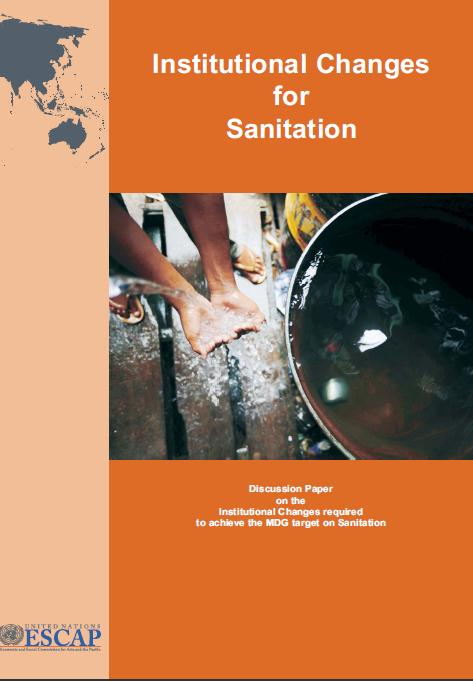Institutional Changes for Sanitation - Discussion paper on the institutional changes required to achieve the MDG target on sanitation
Sokou, E. (2009)

Published in: 2009
Publisher:
United Nations ESCAP
Author:
Sokou, E.
Uploaded by:
SuSanA secretariat
Partner profile:
common upload
4731 Views
20 Downloads
Content - Summary
Following the Hashimoto Action Plan of the United Nations Secretary-General’s Advisory Board on Water and Sanitation, the General Assembly of the United Nations declared 2008 International Year of Sanitation (IYS) through Resolution A/C.2/61/L.16/Rev.1 on 4 December 2006. The resolution
expressed concern on the slow and insufficient progress made in achieving the global sanitation target, and recognized that progress can be made through active commitment and action by all States, including at the national and local levels, as well as United Nations agencies, regional and international organizations, civil society organizations and other relevant stakeholders.
In the Asia-Pacific region, rapid socio-economic development has lifted many people out of poverty and has contributed to significant achievements with regards to access to sanitation facilities. Between 1990 and 2006, access to improved sanitation in the region increased by an impressive 73 per cent. Today, more than half of the people of the region have access to improved sanitation facilities. However, this impressive improvement still leaves a staggering 1.76 billion people without adequate sanitation. In fact, compared to other regions, the Asia-Pacific region has the largest number of people who have yet to gain access to basic sanitation.
Against this backdrop, the Water Security Section of the Environment and Development Division of the United Nations Economic and Social Commission for Asia and the Pacific (ESCAP) conducted a survey to identify achievements and delays in institutional changes required to achieve sanitation goals. As part of the survey, a questionnaire was sent to member countries in September 2008, through the regional offices of the WHO and UNICEF. The findings of this survey were discussed and analyzed with government representatives at a regional workshop, held back-to-back with World Toilet Expo and Summit in November 2008. The main findings were also presented to representatives of civil society and NGOs at the 2nd International WASH Practitioners’ Marketplace and Fair, in Cox’s
Bazaar, Bangladesh. This initiative was supported and also contributed to the objectives of the GTZ-funded project on “Integrated Pro-Poor Water and Wastewater Management in Small Towns.”
Bibliographic information
Sokou, E. (2009). Institutional Changes for Sanitation - Discussion paper on the institutional changes required to achieve the MDG target on sanitation. United Nations ESCAP
Filter tags
East Asia & Pacific English















